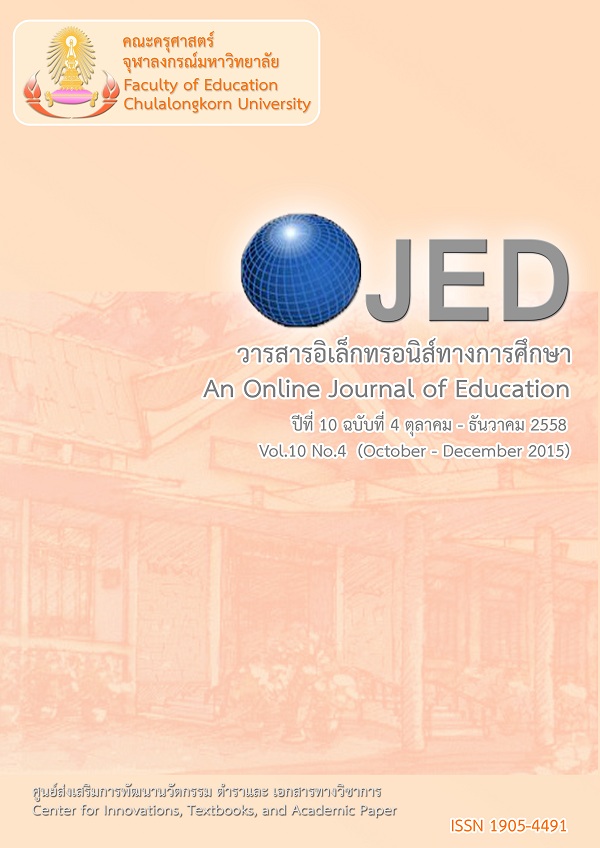การพัฒนาตัวบ่งชี้ความยึดมั่นผูกพันกับความเป็นพลเมืองของนักเรียนไทย
Keywords:
ตัวบ่งชี้, ความยึดมั่นผูกพันกับความเป็นพลเมือง, นักเรียนไทย, INDICATOR, CIVIC ENGAGEMENT, THAI STUDENTSAbstract
การวิจัยนี้มีวัตถุประสงค์เพื่อ 1) พัฒนาตัวบ่งชี้ความยึดมั่นผูกพันกับความเป็นพลเมืองของนักเรียนไทย และ2) ตรวจสอบความสอดคล้องของโมเดลการวัดความยึดมั่นผูกพันกับความเป็นพลเมืองของนักเรียนไทยที่พัฒนาขึ้นกับข้อมูลเชิงประจักษ์ ผู้วิจัยดำเนินการวิจัยเป็น 2 ระยะ ได้แก่ ระยะแรก เป็นการตรวจสอบความเหมาะสมขององค์ประกอบและตัวบ่งชี้ตามกรอบแนวคิดเบื้องต้นโดยการสัมภาษณ์ผู้เชี่ยวชาญจำนวน 11 คน เครื่องมือที่ใช้ในการวิจัยในรอบที่ 1 คือ แบบสัมภาษณ์แบบมีโครงสร้าง และวิเคราะห์ข้อมูลโดยใช้การวิเคราะห์เนื้อหา และระยะที่สอง ผู้วิจัยเก็บข้อมูลกับนักเรียนจำนวน 1398 คน เครื่องมือที่ใช้ในการวิจัยในระยะที่สอง คือ แบบวัดความยึดมั่นผูกพันกับความเป็นพลเมืองของนักเรียนไทย และวิเคราะห์ข้อมูลโดยใช้สถิติเชิงบรรยายและการวิเคราะห์องค์ประกอบเชิงยืนยันอับสอง
ผลการวิจัยสรุปได้ดังนี้ 1) ตัวบ่งชี้ความยึดมั่นผูกพันกับความเป็นพลเมืองของนักเรียนไทย ประกอบด้วย 4 องค์ประกอบ 11 ตัวบ่งชี้ คือ 1) ด้านความรู้ในการเป็นพลเมือง ประกอบด้วย 1 ตัวบ่งชี้ ได้แก่ ความรู้ในหลักการของระบอบประชาธิปไตย 2) ด้านทักษะพลเมือง ประกอบด้วย 4 ตัวบ่งชี้ ได้แก่ การเข้าถึงข้อมูลข่าวสารของสังคม การคิดอย่างมีวิจารณญาณ การทำงานร่วมกับผู้อื่น และการแก้ปัญหาของสังคม 3) ด้านเจตคติต่อความเป็นพลเมือง ประกอบด้วย 3 ตัวบ่งชี้ ได้แก่ ความรู้สึกในการเป็นส่วนหนึ่งของสังคม ความภาคภูมิใจในสังคม และจิตสำนึกความเป็นพลเมือง และ 4) ด้านพฤติกรรมของการเป็นพลเมือง ประกอบด้วย 3 ตัวบ่งชี้ ได้แก่ การมีส่วนร่วมเพื่อพัฒนาสังคม การใช้สิทธิและปฏิบัติตามหน้าที่ของตนเองที่มีต่อสังคม และความรับผิดชอบต่อตนเองและสังคม 2) โมเดลตัวบ่งชี้ความยึดมั่นผูกพันกับความเป็นพลเมืองของนักเรียนไทยสอดคล้องกับข้อมูลเชิงประจักษ์ โดยมีค่าไค-สแควร์ = 45.97, df = 32, p = 0.06, GFI = 0.99, AGFI = 0.99 และ RMSEA = 0.02
This research aims to 1) develop civic engagement indicators for Thai students. 2) validate model civic engagement indicators for Thai students. The method of research was divided into two phases. The first phase focused on factors and indicators of civic engagement for Thai students by interviewing 11 experts. The first round used structured interviews. Data analysis was done through content analysis. The second phase focused on the validation and invariance test of civic engagement indicators model. The participants of this research were 1398 students. The tool of second phase was questionnaire. Data were analyzed by using descriptive statistics and second order confirmatory factor analysis.
The result showed as follows 1) The indicators of civic engagement for Thai students consist of four factors; 1) civic knowledge, 2) civic skills, 3) civic attitudes and 4) civic behaviors. The first factor consisted of 1 indicator; democratic concepts knowledge. The second factor consisted of 4 indicators; accessing news and information, critical thinking, collaboration and social problem solving. The third factor consisted of 3 indicators; feeling a part of society, proud of society and civic conscious. The fourth factor consisted of 3 indicators; civic participation, using of right and perform of duty to society and self and civic responsibilities. 2) civic engagement indicators model for Thai students founded that the model fit the empirical data. (chi-square = = 45.97, df = 32, p = 0.06, GFI = 0.99, AGFI = 0.99 and RMSEA = 0.02)




